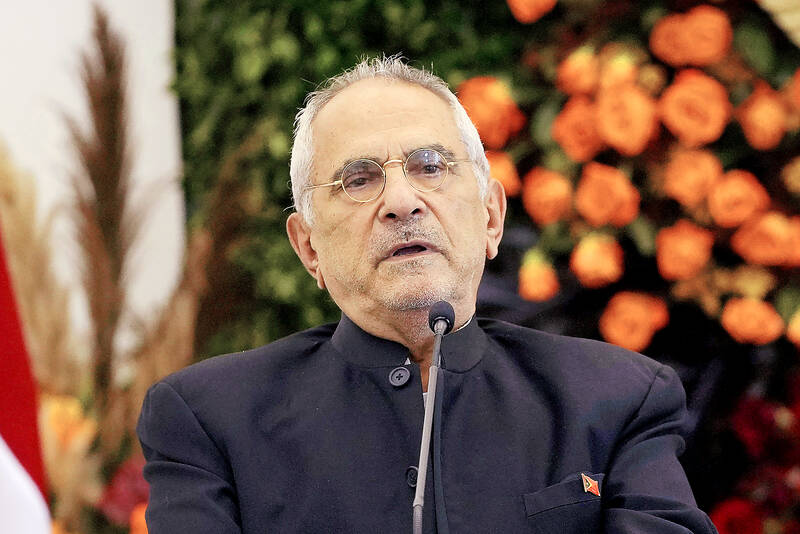East Timorese President Jose Ramos-Horta yesterday said that China could help fund a vast fossil-fuel project seen as crucial to the nation’s economic future, dismissing Western concerns over Beijing’s growing influence.
Speaking to reporters after a meeting with Australian Prime Minister Anthony Albanese in Canberra, the Nobel Peace Prize laureate said “of course, China” could be involved in the Greater Sunrise project, which aims to tap trillions of cubic meters of natural gas.
The project, located in waters between East Timor and Australia, has long been touted as a joint venture between the two countries.

Photo: AP
However, exploration has been stalled for years due to disputes over maritime boundaries and whether the gas should be refined in Australia or East Timor.
Ramos Horta is pushing hard to gain foreign financing and to have liquefied natural gas facilities built in his country, seeing it as a potential economic game changer.
He told reporters that a number of Asia-Pacific countries could be involved in the project — including Japan and South Korea — but also mooted Beijing’s involvement, aware it was likely to raise hackles in Canberra.
“Of course China [could be involved]. It’s a pipeline, we are not talking about maritime security. It’s just a pipeline. China would just be an investor,” he said.
However, policymakers in Canberra are likely to baulk at Chinese involvement in critical infrastructure so close to Australia’s borders.
Australia is already concerned about China’s rapidly expanding regional influence, including in East Timor, which gained independence in 2002 and sits just a few hundred kilometers off Australia’s northern coast.
China built the country’s parliament, Ramos-Horta’s presidential palace and the foreign ministry.
Revenues from existing fossil-fuel projects are soon expected to run dry and the country’s sovereign wealth fund is rapidly dwindling, leading some to warn of an impending “fiscal cliff.”
Australian Minister for Foreign Affairs Penny Wong (黃英賢) recently told Dili that it faces some “pretty serious economic challenges” and warned against the risks of so-called “debt trap” diplomacy, a term widely used in reference to Chinese investment strategy in countries like Sri Lanka.
“Our debt, our loans, they are in the spirit of wanting East Timor to be more resilient,” she said on a visit to the island nation’s capital. “We know that economic resilience can be affected, can be constrained, by unsustainable debt burdens or by lenders who have different objectives.”

Japanese Prime Minister Sanae Takaichi yesterday lavished US President Donald Trump with praise and vows of a “golden age” of ties on his visit to Tokyo, before inking a deal with Washington aimed at securing critical minerals. Takaichi — Japan’s first female prime minister — pulled out all the stops for Trump in her opening test on the international stage and even announced that she would nominate him for a Nobel Peace Prize, the White House said. Trump has become increasingly focused on the Nobel since his return to power in January and claims to have ended several conflicts around the world,

UKRAINE, NVIDIA: The US leader said the subject of Russia’s war had come up ‘very strongly,’ while Jenson Huang was hoping that the conversation was good Chinese President Xi Jinping (習近平) and US President Donald Trump had differing takes following their meeting in Busan, South Korea, yesterday. Xi said that the two sides should complete follow-up work as soon as possible to deliver tangible results that would provide “peace of mind” to China, the US and the rest of the world, while Trump hailed the “great success” of the talks. The two discussed trade, including a deal to reduce tariffs slapped on China for its role in the fentanyl trade, as well as cooperation in ending the war in Ukraine, among other issues, but they did not mention

REASSURANCE: The US said Taiwan’s interests would not be harmed during the talk and that it remains steadfast in its support for the nation, the foreign minister said US President Donald Trump on Friday said he would bring up Taiwan with Chinese President Xi Jinping (習近平) during a meeting on the sidelines of the APEC Summit in South Korea this week. “I will be talking about Taiwan [with Xi],” Trump told reporters before he departed for his trip to Asia, adding that he had “a lot of respect for Taiwan.” “We have a lot to talk about with President Xi, and he has a lot to talk about with us. I think we’ll have a good meeting,” Trump said. Taiwan has long been a contentious issue between the US and China.

GLOBAL PROJECT: Underseas cables ‘are the nervous system of democratic connectivity,’ which is under stress, Member of the European Parliament Rihards Kols said The government yesterday launched an initiative to promote global cooperation on improved security of undersea cables, following reported disruptions of such cables near Taiwan and around the world. The Management Initiative on International Undersea Cables aims to “bring together stakeholders, align standards, promote best practices and turn shared concerns into beneficial cooperation,” Minister of Foreign Affairs Lin Chia-lung (林佳龍) said at a seminar in Taipei. The project would be known as “RISK,” an acronym for risk mitigation, information sharing, systemic reform and knowledge building, he said at the seminar, titled “Taiwan-Europe Subsea Cable Security Cooperation Forum.” Taiwan sits at a vital junction on